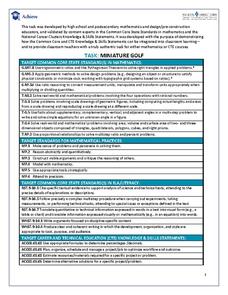Curated OER
Mixed Breed Fantasy Animals
Ever seen a crockapeep or a giraffule? How about a catmel? Elementary school artists are encouraged to let their imaginations roam and create images of imaginary creatures by combining parts of two or more animals,
NASA
Soda Straw Rockets
Three, two, one, blast off to a better understanding of force and motion with this exciting science lesson! Beginning with a discussion about rockets and gravity, young scientists go on to complete a series of worksheets about net forces...
Roy Rosenzweig Center for History and New Media
European Explorers
To compare how the Spanish, French, and English approached the exploration of North America, class groups examine primary source documents and become experts on one of four explorers: Francisco Coronado, Robert LaSalle, Samuel de...
Exploratorium
Blue Sky
Use a container full of water as a prism and show that as light is bent, the individual colors from different wavelengths become visible. This explains why the sky appears to be blue midday, and why as the sun nears the horizon, it looks...
Texas State Energy Conservation Office
Investigation: Chemical Models
Science teams make models of four different hydrocarbon compounds that we commonly use for fuel. Then they demonstrate chemical reactions that result when energy is produced. This can be used as an enrichment when your class is studying...
Exploratorium
Building Three-Dimensional Structures
Are you looking for a good 3-D geometry lesson that includes hands-on activities for your middle schoolers? Look no further than this one! Pupils use centimeter grid paper embedded in the plan, along with detailed construction...
PBS
Lessons - Feeling Hot, Hot, Hot!
Volcanoes are among the most spectacular geological features on the planet. Jump into an exploration of these amazing phenomenon with this multimedia lesson series. Working collaboratively in small groups, young scientists view videos...
Illustrative Mathematics
Waiting Times
Probability prevails in this assignment as youngsters determine the probability of finding a blue pen in a cereal box when they can come in blue, green, yellow, or red. Learners set up a simulation to determine the outcome of compound...
Curated OER
Thrilling Information: Music and Reading
Here’s a cross-curricular program music activity that uses Peer Gynt to engage class members. Groups take one section of “In the Hall of the Mountain King,” choreograph their section of the tune to represent the story as they imagine it,...
McAuliffe-Shepard Discovery Center
Global Warming in a Jar
This well-organized lab activity introduces earth science pupils to the greenhouse effect. They will set up two experiments to monitor temperatures in an open jar, a closed jar, and a closed jar containing water. Ideally, you would have...
Teacher Stream
Mastering Online Discussion Board Facilitation
Build a class community, allow time for in-depth reflection and research, and facilitate the learning and writing process with online discussion boards! A resource delves into the benefits and purposes of discussion boards, as well as...
SeaWorld
Animal Migrations
Here is a fabulous set of activities for your young scientists. Each lesson plan contains map, hands-on, and game activities that will help the class understand why and how animals migrate from one place to another. First they'll examine...
Scholastic
Study Jams! Number Patterns
Finding patterns is an essential skill for mathematicians of all ages. Follow along with Zoe as she walks step-by-step through the process of identifying and completing number patterns. Work through the Try It! problems as a whole class...
Scholastic
Study Jams! Multiplication
What does baking cupcakes have to do with multiplication? Watch this video and find out as your class learns that multiplication is the repeated addition of equal groups. Properties of multiplication are also introduced with...
Curated OER
Task: Miniature Golf
"Fore!" All right, no one really yells this out in miniature golf, but this well-defined activity will have your charges using lots of numbers in their unique design of a miniature golf hole. Included in the activity criteria is the...
Baylor College
What Is the Water Cycle?
Small groups place sand and ice in a covered box, place the box in the sunlight, then observe as evaporation, condensation, and precipitation occur. These models serve as miniature water cycles and demonstrations of the three phases of...
Baylor College
Fossil Fuels and the Carbon Cycle
Humans are quickly depleting Earth's fossil fuels and locating them is becoming increasingly difficult! Layered muffins are used for models as young geologists take core samples in order to determine the presence of oil. Consider first...
Baylor College
Modeling Earth's Atmosphere
Life on Earth is made possible by the unique composition of its atmosphere. Working collaboratively, a scale model is created as young scientists learn about the different layers of gas that surround the planet. Cards are included that...
Scholastic
Study Jams! Fractions
What can quesadillas teach your class about fractions? More than you might think. AJ and Zoe from the StudyJams! crew use this Mexican cuisine to explain how fractions are just equal parts of a whole, defining the key terms numerator and...
Scholastic
Study Jams! Integers
Stay positive, teaching about integers just got a little easier! Explain how positive and negative numbers are opposites using number lines and real-world examples. The included assessment provides an excellent opportunity to check for...
Baylor College
Why Circulate?
Lub-dub, lub-dub. Why does the heart beat? Why does blood circulate throughout the body? Life scientists find out how important circulation is for dissolving and dispersing materials by timing how long it takes for food coloring spread...
Illustrative Mathematics
Fractions and Rectangles
Visual models are excellent teaching tools when explaining equivalent fractions. Looking at a rectangle cut into twelfths, students first identify the shaded fraction, and then explain whether the fraction is equal to one-fourth....
Baylor College
Pre-Assessment: The Brain
Break your class in to the general structure and function of the brain. Brainiacs discuss what they know about it and create personalized brain development timelines. They also take a true-false, pre-assessment quiz to get them thinking...
Baylor College
What Is a Neuron?
Your class won't get on your nerves while doing this modeling activity! After teaching the structure and function of a neuron using the included diagrams, give individuals some clay and chenille stems so that they can make their own...























